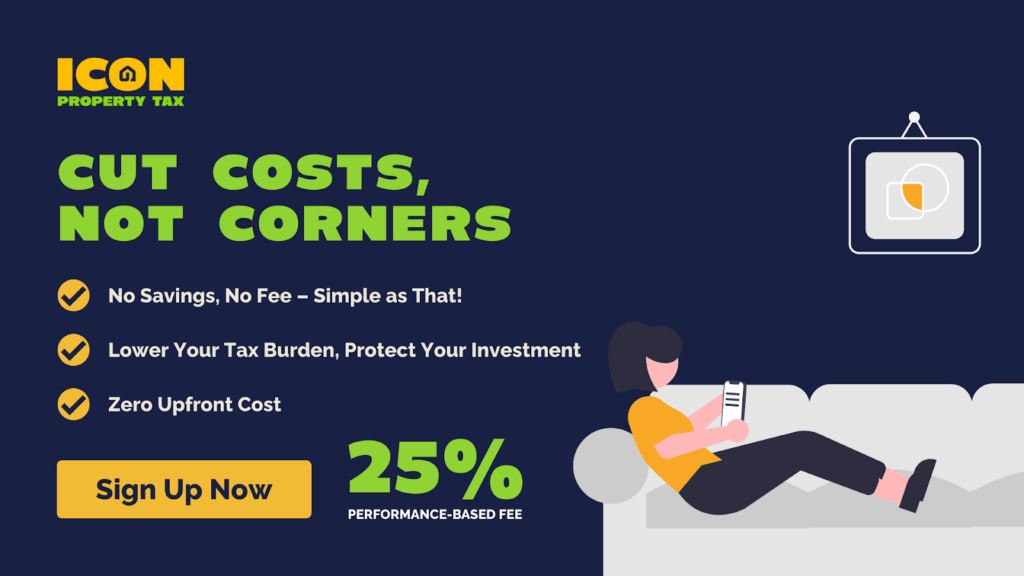Property Tax Assessments Demystified: How They Affect Your Texas Home
October 8, 2025
Key Takeaways:
- Assessment Impact: Property value directly affects how much tax you pay in Texas, making accuracy essential.
- Appeal Opportunity: Homeowners can appeal yearly if they believe their appraisal is unfair or incorrect.
- Expert Support: Icon helps Texas homeowners reduce taxes by identifying errors and managing the entire appeal process.
Property tax assessments are a part of homeownership that many Texans don’t fully understand until the bill arrives. Your home’s appraised value, as determined by the county appraisal district, directly affects what you pay in property taxes each year. In fast-changing markets, these values can swing higher than expected, leaving homeowners questioning their accuracy. That’s where knowing your rights and your options becomes essential.
At Icon, we’ve spent years helping homeowners across Texas challenge inflated property tax values. Our team handles thousands of appeals each season, using data-driven strategies and local expertise to secure real reductions. We do the work, so you don’t have to navigate complex deadlines, documents, or hearings alone. Our results speak for themselves: more savings, less stress, and a fairer process.
Understanding Property Tax Assessments In Texas
Every year, Texas homeowners receive a notice from their local appraisal district. This notice isn’t a bill, but it plays a major role in what you’ll eventually owe in property taxes. It’s called a property tax assessment, and it determines the appraised value of your home for tax purposes.
Texas doesn’t have a state income tax, so local governments rely heavily on property taxes to fund public services. That includes things like schools, emergency services, and road maintenance. Your property’s assessed value is used by local taxing entities to calculate what you owe. If that value is set too high, you could be paying more than your fair share.
Understanding how your assessment works is the first step to making sure you’re not overpaying. It’s also the foundation for deciding whether to file a property tax appeal.
If you believe your home’s value was assessed inaccurately, working with a team like Icon Property Tax can help you navigate the process and reduce your tax liability.

Why Your Assessed Value Matters
Many Texas homeowners don’t realize how closely their property taxes are tied to the assessed value of their home. A higher value means a higher tax bill, even if nothing has changed about your property. Here’s how your assessed value plays a central role in what you pay each year:
How Property Taxes Are Calculated
Your local taxing entities such as the city, county, school district, and special districts, each set their own tax rates. These rates are applied to the appraised value of your home to determine your total property tax bill. Even a small increase in assessed value can lead to hundreds or thousands more in annual taxes.
The Cost Of Overassessment
If your property is overvalued, you’re paying more than your fair share. Overassessments are especially common in rapidly appreciating neighborhoods where valuations lag behind market trends. For example, a 10 percent overvaluation on a $400,000 home means you could be paying taxes on $440,000 instead, an unnecessary burden.
When To Consider An Appeal
If your home’s appraised value seems out of line with similar properties in your neighborhood, it may be time to take a closer look. A property tax appeal gives you the chance to correct the valuation and lower your tax obligation. Services like Icon Property Tax can help review your assessment and guide you through the appeal process.
How To Read Your Property Tax Assessment Notice
When your property tax assessment arrives in the mail, it can feel overwhelming at first. But taking a few minutes to understand each part of the notice can help you catch errors, spot opportunities for appeal, and stay in control of your tax burden. Here’s what to look for when reviewing your notice:
Assessed Value Of Your Property
This is the appraisal district’s estimate of your home’s market value as of January 1st of the current year. It includes the value of the land and any improvements, such as your house, garage, or pool. If this number seems too high, it may not reflect the actual condition or comparable sales in your area.
Exemptions Applied
Texas offers several property tax exemptions, including the homestead exemption, over-65 exemption, and disabled veteran exemption. Your notice should list any exemptions applied and subtract them from the total appraised value. If an exemption is missing, your taxable value could be inflated unnecessarily.
Taxing Entities And Rates
Each local taxing authority that collects property taxes from your home will be listed, along with their proposed tax rate. These include your city, county, school district, and any special utility or improvement districts. Make sure you understand who is taxing your property and at what rate.
Deadline To File An Appeal
Every assessment notice includes a deadline for filing an appeal, typically within 30 days of receiving the notice. To avoid overpaying based on an incorrect value, Icon Property Tax can help you prepare a timely and effective appeal before the window closes.
Common Reasons To Appeal Your Assessment
Not every property assessment is accurate, and many Texas homeowners successfully lower their tax bills by appealing. If your home has been overvalued, or if there’s an error in your property details, you have the right to challenge the appraisal. These are some of the most common reasons for filing a property tax appeal:
Market Value Is Too High
If your home’s appraised value is higher than recent sales of comparable homes in your neighborhood, that’s a strong case for an appeal. Appraisal districts use mass valuation models, which often miss key details about specific properties. You can request sales data or a comparative market analysis to support your claim.
Incorrect Property Information
Mistakes happen, and incorrect data can inflate your tax bill. Look for errors like the wrong square footage, an extra bathroom that doesn’t exist, or improvements that were never made. These issues are often easy to verify and correct during the appeal process.
Damage Or Deterioration
If your home has sustained damage or is in need of major repairs, it may not be worth what the appraisal district thinks. Foundation issues, roof problems, or flood damage can significantly reduce your property’s market value. Be sure to gather documentation like repair estimates or inspection reports.
Unequal Appraisal Compared To Similar Homes
Your property should be assessed in line with similar homes in your area. If you notice that neighboring properties with similar size and features are valued much lower, you may have grounds for an appeal based on equity. Icon Property Tax specializes in identifying these types of disparities and building a strong appeal around them.

Filing A Property Tax Appeal In Texas
If you believe your assessment is too high, you have the legal right to appeal it. Texas offers several methods for filing, and it’s important to follow the correct steps and meet all deadlines. Here’s how the appeal process typically works:
Review Your Notice And Gather Evidence
Start by carefully reviewing your assessment notice. Look for discrepancies in value, property details, or missed exemptions. Then gather supporting evidence, such as recent sales of comparable homes, photographs of property damage, or third-party appraisals.
File By The Deadline
Most counties require you to file your appeal within 30 days of receiving your notice or by May 15, whichever is later. Missing this deadline means losing the opportunity to challenge the value until the next year. It’s best to act quickly once you spot a potential issue.
Choose Your Appeal Method
Texas homeowners can typically appeal by mail, in person, or online, depending on the county. You’ll present your case to the Appraisal Review Board (ARB), which is an independent panel that hears valuation disputes. Icon Property Tax handles this entire process for you, preparing your case and appearing on your behalf when needed.
Await The Decision
After your hearing, the ARB will make a decision based on the evidence presented. If they agree that your property was overvalued, they will adjust your appraisal accordingly. This new value will be used to calculate your final tax bill.
How Icon Helps Homeowners Lower Their Tax Bills
Appealing your property taxes can feel like a time-consuming process, especially if you’re unfamiliar with the local rules or short on documentation. That’s where a dedicated partner like Icon makes all the difference. Here’s how their team simplifies the appeal process and helps you save money:
Local Knowledge And Expertise
Icon focuses exclusively on Texas property taxes. Their team understands how each county’s appraisal district operates and knows what kind of evidence is most effective. This local expertise increases your chances of a successful appeal.
End-To-End Appeal Support
From reviewing your assessment to filing all paperwork and representing you during hearings, Icon manages the entire process. There’s no need to navigate deadlines or legal language on your own. Icon Property Tax provides a complete service that keeps the appeal moving and gives you peace of mind.
Results That Speak For Themselves
Icon has a proven track record of helping Texas homeowners reduce inflated property values. By identifying errors, gathering compelling evidence, and managing communication with the appraisal district, they deliver measurable savings year after year.

Final Thoughts
Property tax assessments don’t have to be a mystery. By understanding how your home’s value is calculated, knowing your rights as a property owner, and recognizing when an appeal makes sense, you can take control of your tax burden instead of being surprised by it year after year.
For many homeowners, working with professionals is the most efficient way to ensure fair treatment. Icon Property Tax has helped thousands of Texans challenge inaccurate assessments and lower their property tax bills. Their knowledge, strategy, and hands-on support allow you to move through the appeal process with clarity and confidence.
Read Also:
- Denton County Property Tax: Everything Homeowners Need To Know
- Brazoria County Property Tax: Understanding Rates, Exemptions, And Deadlines
- Bexar County Property Tax Appeal: How It Works And What To Expect
Frequently Asked Questions About Property Tax Appeal Letter
What is a property tax appeal letter, and why is it important?
A property tax appeal letter is a formal written request to your local appraisal district asking them to reconsider your property’s assessed value. It helps you document your case and begins the official appeal process.
Does sending a property tax appeal letter guarantee a reduction?
No, but a well-supported letter improves your chances. Strong evidence and clearly presented facts are critical for success in the review process.
Can I write my own property tax appeal letter, or should I use a service?
You can write your own letter, especially if you’re comfortable gathering data and making your case. However, professional services like Icon Property Tax often increase the likelihood of a successful appeal.
When is the best time to send a property tax appeal letter in Texas?
You should submit your appeal letter after receiving your assessment notice but before the deadline, typically by May 15 or 30 days from the notice date.
What should I include in my property tax appeal letter?
Your letter should state your reasons for appealing, your opinion of the correct value, and evidence like comparable sales, repair estimates, or appraisal reports.
Does appealing affect future property assessments negatively?
No, filing an appeal does not penalize you in future assessments. Appraisal districts are required to assess values fairly each year, regardless of past appeals.
Can I appeal my Texas property tax assessment every year?
Yes, homeowners in Texas can appeal their property assessment annually if they believe the value is incorrect or unfair.
How long does the appeal process take after submitting the letter?
The timeline varies by county, but most appeals are reviewed within a few weeks to a few months. Some may require a formal hearing with the Appraisal Review Board.
Is there a cost to file a property tax appeal in Texas?
There is no cost to file an appeal directly with your appraisal district. However, third-party services may charge a contingency fee based on savings achieved.
What happens if my appeal is denied?
If your appeal is denied, you can request a formal hearing or pursue binding arbitration or litigation, depending on your situation and desired outcome.

